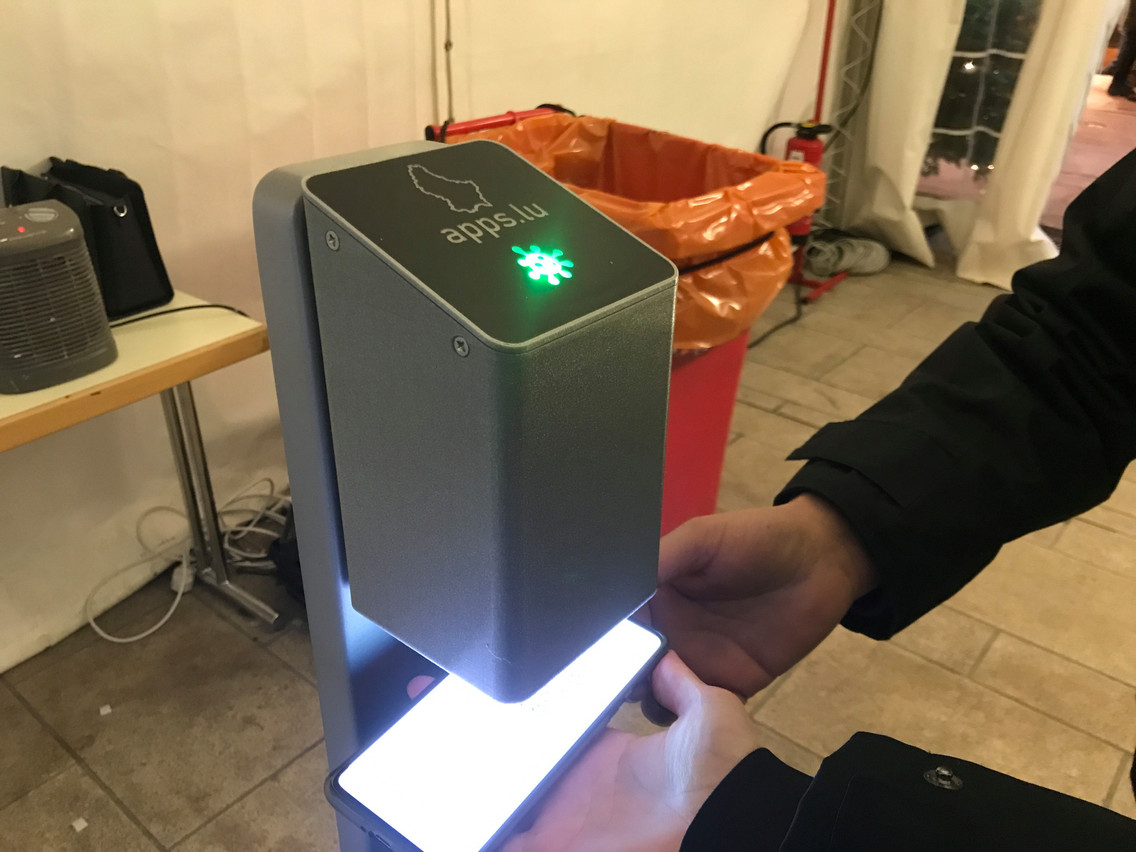You may have already come across these grey terminals at the entrance of one of the Christmas markets in Luxembourg City. You had to slide your QR code underneath and wait for a moment before the LED turned green or red. Depending on the colour, the security guard would indicate whether it was possible to enter or not.
“They were in the test phase,” explains Steve Reisdorf, CEO of software company Kirepo, which markets them. “That problem no longer exists,” he says. “Naturally, there is a waiting time, but the scans are faster.” Above all, “we have added new features”. For example, there is the possibility of linking the terminal to turnstiles, which will let the person through or not depending on the result of their QR code or to a printer that issues a ticket. “We can adapt to demand,” says Reisdorf.
A home-made software
More than 150 devices have been supplied to a hundred or so customers since mid-November. “These include companies in the financial sector, the hotel and catering industry, the retail sector and local authorities,” explains Reisdorf.
The idea came from his partner when he noticed the difficulties posed by the new health restrictions in restaurants. The software company then approached LuxSecurity to develop this terminal. The security company, which has 39 full-time employees and a turnover of €4.8m in 2020, supplies Kirepo with the legs of the terminal and the 3D boxes. Kirepo then assembles them, adds the electronic base and develops the QR code verification software. The kiosk is not connected to CovidCheck.lu, but to Kirepo's application.
The system is updated as soon as there are changes in the law “with the same speed as that of the state”, says Reisdorf. The device works offline but updates can be done by connecting it to the internet. Did the company need specific accreditation to offer such software, which manages health data? “We made the requests, we never got an answer. We asked around ourselves and did not find any rules that say there is only the CovidCheck.lu application.”
The National Commission for Data Protection (CNPD) had not responded to an inquiry by Delano's sister publication Paperjam at the time of writing this article. The economy ministry, to which the ministry of digitalisation referred a request for comment, said that “when the company does not save or process such data in any form, it does not need any particular additional authorisations.”
Reisdorf says that the customer can choose not to save the scans or to save them if they want to prove that they have carried out a check. In either case, “we don't have access to it”, he says.
New business
The development of the terminal represented an investment of €50,000 for Kirepo. A basic terminal costs €799. With LuxSecurity, “we sell together and share 50/50”, says the CEO of the software company.
Founded in 2003, Kirepo employs 6.77 full-time employees according to the trade and companies register (RCS) and has an annual turnover of €1.2m according to its director. For him, “the terminal represents one more product, which will not remain for all time. But I think it will be useful for a while yet.”
He expects new requests before and after 15 January, when CovidCheck becomes compulsory at work. “It also represents an opportunity to approach new customers that we didn't have before. We've already done a kiosk project at someone's house who asked us to develop an app afterwards.”
“We are the only ones doing this in Luxembourg,” says Reisdorf. If you do some research on the internet, you will find other health pass control terminals that are not from the grand duchy. It remains to be seen whether this is a covid product that will grow, like the masks. Or if the demand will subside, as was the case for other businesses born out of the health crisis.
This story was first published in French on . It has been translated and edited for Delano.
